Help us make food transparency the norm!
As a non-profit organization, we depend on your donations to continue informing consumers around the world about what they eat.
The food revolution starts with you!
Schweizer Marktmagenbrot - Aldi - 250 g
Schweizer Marktmagenbrot - Aldi - 250 g
This product page is not complete. You can help to complete it by editing it and adding more data from the photos we have, or by taking more photos using the app for Android or iPhone/iPad. Thank you!
×
Barcode: 4099200428413 (EAN / EAN-13)
Quantity: 250 g
Brands: Aldi
Categories: Snacks, Sweet snacks, Biscuits and cakes, Pastries, Gingerbreads
Labels, certifications, awards:
Vegetarian, Vegan, FSC, FSC Mix
Origin of ingredients: Switzerland
Manufacturing or processing places: Schweiz
Traceability code: FSC-C028111
Stores: Aldi
Countries where sold: Switzerland
Matching with your preferences
Health
Ingredients
-
16 ingredients
German: Weizenmehl, Zucker, Wasser, Backtriebmittel (E501), Gewürzmischung, Kakao, Emulgator (E471), Traubenzucker, Säuerungsmittel (Weinsäure), Konservierungsstoff (E200), Feuchthaltemittel (Sorbit)Allergens: Gluten
Food processing
-
Ultra processed foods
Elements that indicate the product is in the 4 - Ultra processed food and drink products group:
- Additive: E420 - Sorbitol
- Additive: E471 - Mono- and diglycerides of fatty acids
- Ingredient: Emulsifier
- Ingredient: Humectant
Food products are classified into 4 groups according to their degree of processing:
- Unprocessed or minimally processed foods
- Processed culinary ingredients
- Processed foods
- Ultra processed foods
The determination of the group is based on the category of the product and on the ingredients it contains.
Additives
-
E200 - Sorbic acid
Sorbic acid: Sorbic acid, or 2‚4-hexadienoic acid, is a natural organic compound used as a food preservative. It has the chemical formula CH3-CH-4CO2H. It is a colourless solid that is slightly soluble in water and sublimes readily. It was first isolated from the unripe berries of the Sorbus aucuparia -rowan tree-, hence its name.Source: Wikipedia
-
E334 - L(+)-tartaric acid
Tartaric acid: Tartaric acid is a white, crystalline organic acid that occurs naturally in many fruits, most notably in grapes, but also in bananas, tamarinds, and citrus. Its salt, potassium bitartrate, commonly known as cream of tartar, develops naturally in the process of winemaking. It is commonly mixed with sodium bicarbonate and is sold as baking powder used as a leavening agent in food preparation. The acid itself is added to foods as an antioxidant and to impart its distinctive sour taste. Tartaric is an alpha-hydroxy-carboxylic acid, is diprotic and aldaric in acid characteristics, and is a dihydroxyl derivative of succinic acid.Source: Wikipedia
-
E420 - Sorbitol
Sorbitol: Sorbitol --, less commonly known as glucitol --, is a sugar alcohol with a sweet taste which the human body metabolizes slowly. It can be obtained by reduction of glucose, which changes the aldehyde group to a hydroxyl group. Most sorbitol is made from corn syrup, but it is also found in nature, for example in apples, pears, peaches, and prunes. It is converted to fructose by sorbitol-6-phosphate 2-dehydrogenase. Sorbitol is an isomer of mannitol, another sugar alcohol; the two differ only in the orientation of the hydroxyl group on carbon 2. While similar, the two sugar alcohols have very different sources in nature, melting points, and uses.Source: Wikipedia
-
E471 - Mono- and diglycerides of fatty acids
Mono- and diglycerides of fatty acids (E471), are food additives commonly used as emulsifiers in various processed foods.
These compounds consist of glycerol molecules linked to one or two fatty acid chains, which help stabilize and blend water and oil-based ingredients. E471 enhances the texture and shelf life of products like margarine, baked goods, and ice cream, ensuring a smooth and consistent texture.
It is generally considered safe for consumption within established regulatory limits.
-
E501 - Potassium carbonates
Potassium carbonate: Potassium carbonate -K2CO3- is a white salt, which is soluble in water -insoluble in ethanol- and forms a strongly alkaline solution. It can be made as the product of potassium hydroxide's absorbent reaction with carbon dioxide. It is deliquescent, often appearing a damp or wet solid. Potassium carbonate is used in the production of soap and glass.Source: Wikipedia
Ingredients analysis
-
May contain palm oil
Ingredients that may contain palm oil: E471
-
Vegan
No non-vegan ingredients
Unrecognized ingredients: Grape sugar
-
Vegetarian
No non-vegetarian ingredients detected
Unrecognized ingredients: Grape sugar
-
Details of the analysis of the ingredients
de: Weizenmehl, Zucker, Wasser, Backtriebmittel (e501), Gewürzmischung, Kakao, Emulgator (e471), Traubenzucker, Säuerungsmittel (Weinsäure), Konservierungsstoff (e200), Feuchthaltemittel (Sorbit)- Weizenmehl -> en:wheat-flour - vegan: yes - vegetarian: yes - ciqual_proxy_food_code: 9410 - percent_min: 9.09090909090909 - percent_max: 100
- Zucker -> en:sugar - vegan: yes - vegetarian: yes - ciqual_proxy_food_code: 31016 - percent_min: 0 - percent_max: 50
- Wasser -> en:water - vegan: yes - vegetarian: yes - ciqual_food_code: 18066 - percent_min: 0 - percent_max: 33.3333333333333
- Backtriebmittel -> en:raising-agent - percent_min: 0 - percent_max: 25
- e501 -> en:e501 - vegan: yes - vegetarian: yes - percent_min: 0 - percent_max: 25
- Gewürzmischung -> en:mixed-spices - vegan: yes - vegetarian: yes - percent_min: 0 - percent_max: 20
- Kakao -> en:cocoa - vegan: yes - vegetarian: yes - ciqual_proxy_food_code: 18100 - percent_min: 0 - percent_max: 16.6666666666667
- Emulgator -> en:emulsifier - percent_min: 0 - percent_max: 14.2857142857143
- e471 -> en:e471 - vegan: maybe - vegetarian: maybe - from_palm_oil: maybe - percent_min: 0 - percent_max: 14.2857142857143
- Traubenzucker -> en:grape-sugar - percent_min: 0 - percent_max: 12.5
- Säuerungsmittel -> en:acid - percent_min: 0 - percent_max: 11.1111111111111
- Weinsäure -> en:e334 - vegan: yes - vegetarian: yes - percent_min: 0 - percent_max: 11.1111111111111
- Konservierungsstoff -> en:preservative - percent_min: 0 - percent_max: 10
- e200 -> en:e200 - vegan: yes - vegetarian: yes - percent_min: 0 - percent_max: 10
- Feuchthaltemittel -> en:humectant - percent_min: 0 - percent_max: 9.09090909090909
- Sorbit -> en:e420 - vegan: yes - vegetarian: yes - percent_min: 0 - percent_max: 9.09090909090909
Nutrition
-
Missing data to compute the Nutri-Score
Missing nutrition facts
⚠ ️The nutrition facts of the product must be specified in order to compute the Nutri-Score.Could you add the information needed to compute the Nutri-Score? Add nutrition facts
-
Nutrient levels
-
Fat in low quantity (1.1%)
What you need to know- A high consumption of fat, especially saturated fats, can raise cholesterol, which increases the risk of heart diseases.
Recommendation: Limit the consumption of fat and saturated fat- Choose products with lower fat and saturated fat content.
-
Salt in low quantity (0.01%)
What you need to know- A high consumption of salt (or sodium) can cause raised blood pressure, which can increase the risk of heart disease and stroke.
- Many people who have high blood pressure do not know it, as there are often no symptoms.
- Most people consume too much salt (on average 9 to 12 grams per day), around twice the recommended maximum level of intake.
Recommendation: Limit the consumption of salt and salted food- Reduce the quantity of salt used when cooking, and don't salt again at the table.
- Limit the consumption of salty snacks and choose products with lower salt content.
-
-
Nutrition facts
Nutrition facts As sold
for 100 g / 100 mlAs sold
per serving (30g)Compared to: Gingerbreads Energy 1,374 kj
(324 kcal)412 kj
(97 kcal)-7% Fat 1.1 g 0.33 g -80% Saturated fat ? ? Carbohydrates 72 g 21.6 g +5% Sugars ? ? Fiber ? ? Proteins 6.6 g 1.98 g +38% Salt 0.01 g 0.003 g -98% Fruits‚ vegetables‚ nuts and rapeseed‚ walnut and olive oils (estimate from ingredients list analysis) 0 % 0 %
Environment
-
Eco-Score A - Very low environmental impact
⚠ ️Select a country in order to include the full impact of transportation.The Eco-Score is an experimental score that summarizes the environmental impacts of food products.→ The Eco-Score was initially developped for France and it is being extended to other European countries. The Eco-Score formula is subject to change as it is regularly improved to make it more precise and better suited to each country.Life cycle analysis
-
Average impact of products of the same category: A (Score: 86/100)
Category: Gingerbread
Category: Gingerbread
- PEF environmental score: 0.23 (the lower the score, the lower the impact)
- including impact on climate change: 1.69 kg CO2 eq/kg of product
Stage Impact Agriculture
69.3 %Processing
15.4 %Packaging
8.1 %Transportation
5.1 %Distribution
2.1 %Consumption
0.0 %
Bonuses and maluses
-
Origins of ingredients with a medium impact
Bonus: +5
Environmental policy: +5
Transportation: 0
Origin of the product and/or its ingredients % of ingredients Impact Switzerland 100 %Medium
-
Packaging with a low impact
Malus: -1
Shape Material Recycling Impact 1 Bag FSC paper Low
Eco-Score for this product
-
Impact for this product: A (Score: 90/100)
Product: Schweizer Marktmagenbrot - Aldi - 250 g
Life cycle analysis score: 86
Sum of bonuses and maluses: +4
Final score: 90/100
-
Carbon footprint
-
Equal to driving 0.9 km in a petrol car
169 g CO² per 100g of product
The carbon emission figure comes from ADEME's Agribalyse database, for the category: Gingerbread (Source: ADEME Agribalyse Database)
Stage Impact Agriculture
61.5 %Processing
11.8 %Packaging
17.1 %Transportation
8.5 %Distribution
1.2 %Consumption
0.0 %
Packaging
-
Packaging with a low impact
-
Packaging parts
1 x Bag (FSC paper)
-
Packaging materials
Material % Packaging weight Packaging weight per 100 g of product Paper or cardboard
-
Transportation
-
Origins of ingredients
Origins of ingredients with a medium impact
Origin of the product and/or its ingredients % of ingredients Impact Switzerland 100 %Medium
Report a problem
-
Incomplete or incorrect information?
Category, labels, ingredients, allergens, nutritional information, photos etc.
If the information does not match the information on the packaging, please complete or correct it. Open Food Facts is a collaborative database, and every contribution is useful for all.
Data sources
Product added on by kampion
Last edit of product page on by roboto-app.
Product page also edited by ecoscore-impact-estimator, kiliweb, openfoodfacts-contributors, setomi, yuka.sY2b0xO6T85zoF3NwEKvlmd5dsT7kDH0Nj7liE2Aw46oc6zTbI9N35DnI6s.





